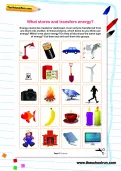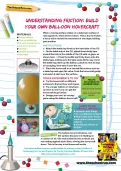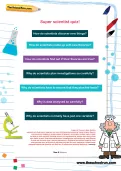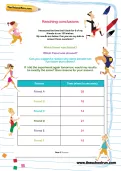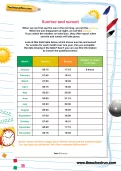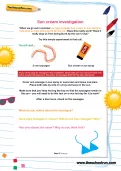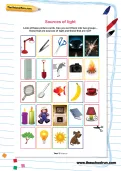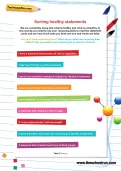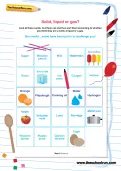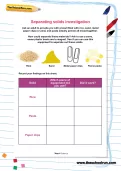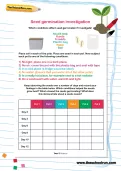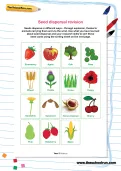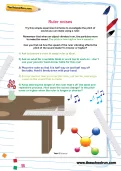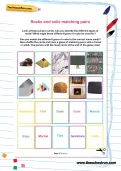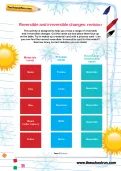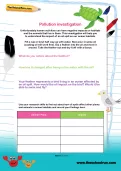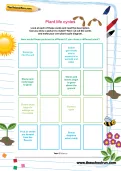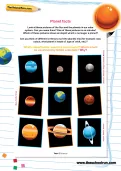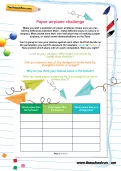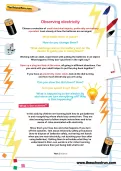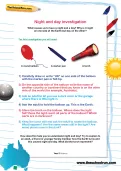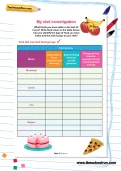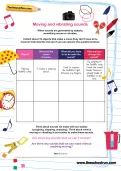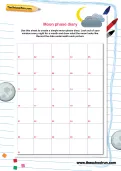When we can first see the sun in the morning, we call this sunrise. When the sun disappears at night, we call this sunset. If you watch the weather on television, they often report when sunrise and sunset will take place. Look at this data table below which shows sunrise and sunset for London for each month over one year. Can you complete the data missing in the table? See if you can use this information to answer the questions below.
or
Register to add to your saved resources
Already a subscriber? to view this content.
When we go out in summer we have to apply sun cream or sun spray to help stop us from being burnt by the sun. Does this really work? Does it really stop us from being burnt by the sun’s rays? Try this simple experiment to find out!
or
Register to add to your saved resources
Already a subscriber? to view this content.
Look at these picture cards. Can you sort them into two groups – those that are sources of light and those that are not?
or
Register to add to your saved resources
Already a subscriber? to view this content.
We are constantly being told what is healthy and what is unhealthy. In this activity you need to use your reasoning skills to read the statement cards and sort out which ones you think are true and which are false.
or
Register to add to your saved resources
Already a subscriber? to view this content.
Look at these cards. Cut them out and then sort them according to whether you think they are a solid, a liquid or a gas. Be careful…some have been put in to challenge you!
or
Register to add to your saved resources
Already a subscriber? to view this content.
Ask an adult to provide you with a bowl filled with rice, sand, metal paper clips (or pins) and pasta (ideally penne) all mixed together. How could separate these materials? Ask to use a sieve, some plastic bowls and a magnet. See if you can use this equipment to separate out these solids.
or
Register to add to your saved resources
Already a subscriber? to view this content.
Let's investigate which conditions affect seed germination!
or
Register to add to your saved resources
Seeds disperse in different ways – through explosion, thanks to animals carrying them and via the wind. Use what you have learned about seed dispersal and your research skills to sort these
seed cards using the sorting sheet on the next page.
or
Register to add to your saved resources
Already a subscriber? to view this content.
Try this simple experiment at home to investigate the pitch of sound you can make using a ruler.
or
Register to add to your saved resources
Already a subscriber? to view this content.
Look at these picture cards. Can you identify the different types of rocks? What might these different types of rocks be used for? Can you match the different types of rocks to the correct name cards? Now shuffle the cards and have a game of matching pairs with a friend or adult. The person with the most cards at the end of the game wins!
or
Register to add to your saved resources
Already a subscriber? to view this content.
This activity is designed to help you revise a range of reversible and irreversible changes. Cut the cards out and place them face up on the table. Try to match up a material card with a process card – can you now find the correct reversible / irreversible card for this match? See how many correct matches you can make!
or
Register to add to your saved resources
Already a subscriber? to view this content.
Unfortunately human activities can have negative impacts on habitats and the animals that live in them. This investigation will help you to understand the impact of an oil spill on our ocean habitats.
or
Register to add to your saved resources
Already a subscriber? to view this content.
Look at each of these cards and read the description. Can you draw a picture to match? Now cut out the cards and make your own plant cycle diagram. How would these pictures be different if you chose a different plant?
or
Register to add to your saved resources
Already a subscriber? to view this content.
Look at these pictures of the Sun and the planets in our solar system. Can you name them? One of these pictures is an intruder! Which of these pictures shows an object which is no longer a planet? Can you think of different criteria to sort the planets into (for example: size, colour, what planet is made of, type of orbit, etc.)?
or
Register to add to your saved resources
Already a subscriber? to view this content.
Make yourself a selection of paper airplanes. You’re going to race your planes against each other, but first decide on the parameters you want to measure (for example, speed or distance). Now predict which plane will win each completion. Were you right?
or
Register to add to your saved resources
Already a subscriber? to view this content.
Choose a selection of small electrical objects, preferably two-battery operated. Look closely at how the batteries are arranged. Open up a plug and look at the wires, all going in different directions. Can you work with your adult helper to put the plug back together? If you have an electricity meter clock, look at the dial turning and how much electricity you are using.
or
Register to add to your saved resources
Already a subscriber? to view this content.
What causes us to have a night and a day? Why is it night on one side of the Earth but day on the other? Let's investigate!
or
Register to add to your saved resources
What foods you have eaten in the last 24 hours? Write them down in the table below. Can you identify the type of food you have eaten and the role it plays in your diet?
or
Register to add to your saved resources
Already a subscriber? to view this content.
When sounds are generated by objects, something moves or vibrates. Collect about 10 objects that make a noise (they don’t have to be musical instruments) and see if you can answer these questions.
or
Register to add to your saved resources
Already a subscriber? to view this content.
Use this sheet to create a simple moon phase diary. Look out of your window every night for a month and draw what the moon looks like. Record the date underneath each picture.
or
Register to add to your saved resources
